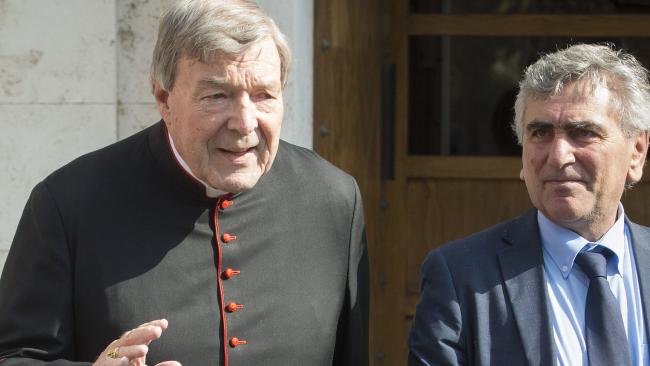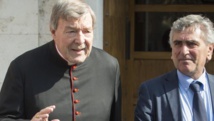Belinda Wallington, a judge at Melbourne Magistrates' Court, said she found enough evidence to commit the 76-year-old to stand trial for about half of the offences he was charged with.
Pell is the highest-ranking Catholic official having to stand trial for sexual abuse. He is currently on leave from the Vatican, where he was the head of finances and one of Pope Francis' most senior aides.
Several others were withdrawn because the complainants were either dead or were severely ill.
The most "vile" of the charges had been dismissed, Pell's lawyer, Robert Richter, insisted.
The names of the complainants, the details of the allegations and the charges against Pell cannot be reported due to legal reasons.
When Wallington asked Pell if he wishes to plead guilty or not guilty, Pell answered, "not guilty,". He remained seated while entering the plea. In the past, he has strenuously denied all allegations.
The first trial hearing will take place on Wednesday at Melbourne County Court, which is just across from the magistrates' court.
Wednesday's directions hearing will go over mostly administrative matters on the first day and likely set a timeline for the trial before a jury, which is expected to go on for many months.
Pell is currently on bail. One of the bail conditions is that he may not leave Australia. He has already handed in his passport.
The hearing on Tuesday lasted for about 90 minutes as the judge read each charge and her decision.
After the judge left the room, several people, mostly survivors and their friends, in the public gallery applauded the decision.
The charges against Pell go back decades.
Pell’s lawyers have indicated they might push for separate trials due to the charges being "vastly different in nature."
Wallington, a supervising magistrate on sexual offences at the magistrates' court, reached her decision after a four-week pre-trial committal hearing which began in March.
She first heard evidence from the alleged victims via video link from a secret location for two weeks behind closed doors. After that, she heard evidence from some 30 witnesses in public.
Pell attended the hearing every day as his lawyers cross-examined the witnesses and complainants.
Several accusations were revealed, including as late as 1996-1997 at a cathedral in Melbourne when Pell was an archbishop.
One of the charges thrown out Tuesday was an allegation Pell abused a complainant during a movie screening in his hometown Ballarat.
"I am not satisfied there is evidence of sufficient weight," said Wallington.
She also struck out a charge centred on an incident at a swimming pool after she found the complainant was an "unsatisfactory witness."
Pell's lawyers argued during the committal hearing the cardinal could have been targeted with false accusations "in an attempt to punish the representative of the Catholic church for not stopping other abuse that has occurred."
Pell, dressed in a dark suit, white shirt and clerical collar, sat next to his supporters in the Melbourne court. He showed no emotion as the judge read the charges against him, often staring down at the floor. He appeared frail.
Due to the growing interest in the case, Tuesday's took place in the court building's largest room. It was fully seated with 90 people.
The cardinal arrived and left the court in a car. He was guarded by a more than two dozen police officers when he entered the building, but had to wait to be frisked for weapons in standard security procedures.
Neither Pell nor his legal team made any comment to the media.
Several protesters had been waiting for him outside the court since early Tuesday. One of them said she was standing in solidarity with "the victims and survivors, in general, who have suffered due to the abuse at the hands of priests and others."
As Pell left the court, one of the protesters shouted, "Hip, hip, hooray." Another one shouted: "No more silence."
Since Pell returned from Rome to face the court in July, he has laid low, staying at Good Shepherd Seminary in Homebush, a quiet Sydney suburb, and flying to Melbourne for his court hearings.
"Cardinal George Pell has at all times fully cooperated with Victoria Police and always and steadfastly maintained his innocence. He has voluntarily returned to Australia to meet these accusations," Sydney archdiocese said in a statement on Tuesday.
"He will defend the remaining charges."
The Archbishop of Melbourne, Denis Hart, declined to make any comment on the decision, but "expressed his confidence in the judicial system in Australia and said that justice must now take its course."
Pell is the highest-ranking Catholic official having to stand trial for sexual abuse. He is currently on leave from the Vatican, where he was the head of finances and one of Pope Francis' most senior aides.
Several others were withdrawn because the complainants were either dead or were severely ill.
The most "vile" of the charges had been dismissed, Pell's lawyer, Robert Richter, insisted.
The names of the complainants, the details of the allegations and the charges against Pell cannot be reported due to legal reasons.
When Wallington asked Pell if he wishes to plead guilty or not guilty, Pell answered, "not guilty,". He remained seated while entering the plea. In the past, he has strenuously denied all allegations.
The first trial hearing will take place on Wednesday at Melbourne County Court, which is just across from the magistrates' court.
Wednesday's directions hearing will go over mostly administrative matters on the first day and likely set a timeline for the trial before a jury, which is expected to go on for many months.
Pell is currently on bail. One of the bail conditions is that he may not leave Australia. He has already handed in his passport.
The hearing on Tuesday lasted for about 90 minutes as the judge read each charge and her decision.
After the judge left the room, several people, mostly survivors and their friends, in the public gallery applauded the decision.
The charges against Pell go back decades.
Pell’s lawyers have indicated they might push for separate trials due to the charges being "vastly different in nature."
Wallington, a supervising magistrate on sexual offences at the magistrates' court, reached her decision after a four-week pre-trial committal hearing which began in March.
She first heard evidence from the alleged victims via video link from a secret location for two weeks behind closed doors. After that, she heard evidence from some 30 witnesses in public.
Pell attended the hearing every day as his lawyers cross-examined the witnesses and complainants.
Several accusations were revealed, including as late as 1996-1997 at a cathedral in Melbourne when Pell was an archbishop.
One of the charges thrown out Tuesday was an allegation Pell abused a complainant during a movie screening in his hometown Ballarat.
"I am not satisfied there is evidence of sufficient weight," said Wallington.
She also struck out a charge centred on an incident at a swimming pool after she found the complainant was an "unsatisfactory witness."
Pell's lawyers argued during the committal hearing the cardinal could have been targeted with false accusations "in an attempt to punish the representative of the Catholic church for not stopping other abuse that has occurred."
Pell, dressed in a dark suit, white shirt and clerical collar, sat next to his supporters in the Melbourne court. He showed no emotion as the judge read the charges against him, often staring down at the floor. He appeared frail.
Due to the growing interest in the case, Tuesday's took place in the court building's largest room. It was fully seated with 90 people.
The cardinal arrived and left the court in a car. He was guarded by a more than two dozen police officers when he entered the building, but had to wait to be frisked for weapons in standard security procedures.
Neither Pell nor his legal team made any comment to the media.
Several protesters had been waiting for him outside the court since early Tuesday. One of them said she was standing in solidarity with "the victims and survivors, in general, who have suffered due to the abuse at the hands of priests and others."
As Pell left the court, one of the protesters shouted, "Hip, hip, hooray." Another one shouted: "No more silence."
Since Pell returned from Rome to face the court in July, he has laid low, staying at Good Shepherd Seminary in Homebush, a quiet Sydney suburb, and flying to Melbourne for his court hearings.
"Cardinal George Pell has at all times fully cooperated with Victoria Police and always and steadfastly maintained his innocence. He has voluntarily returned to Australia to meet these accusations," Sydney archdiocese said in a statement on Tuesday.
"He will defend the remaining charges."
The Archbishop of Melbourne, Denis Hart, declined to make any comment on the decision, but "expressed his confidence in the judicial system in Australia and said that justice must now take its course."









 Home
Home Politics
Politics











